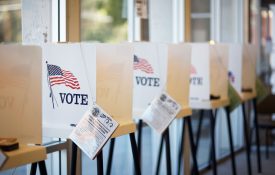-

Preschoolers’ Expectations Shape How They Interpret Speech
When someone misspeaks or forgets a word, we use our past experience with language to hear what we expect them to say — research suggests 4- and 5-year-old children show this adaptive ability to the same degree that adults do.
-

$384,961.42 for a House? When Precise Bids Work and When They Backfire
Making a very precise offer for a car or a house may hurt your chances of success if you’re negotiating with someone who has expertise in that area, a series of studies shows.
-
The Problems with Poor Ballot Design
Scientific American: Tensions are mounting as we hurtle towards Election Day this Tuesday, yet with all the focus on who’s voting and where, most of us have put little thought into another essential part of
-

Some Cognitive Skills Are Easier to Train Later
Older adolescents and adults can learn certain thinking skills, including non-verbal reasoning, more effectively than younger people.
-

Using Science to Understand How Ballot Design Impacts Voter Behavior
Concern over the security of the voting process is a recurring issue, but psychological science suggests an even bigger problem may lurk within our voting systems: poor design.
-
Ready, Set, Type! Touch Typists Are Faster, But Not By Much
The first typewriter, invented by a newspaper printer and editor named Christopher Sholes in 1868, had a keyboard arranged like piano keys. Initially, the inventors thought that an alphabetical arrangement of 28 letters in a

